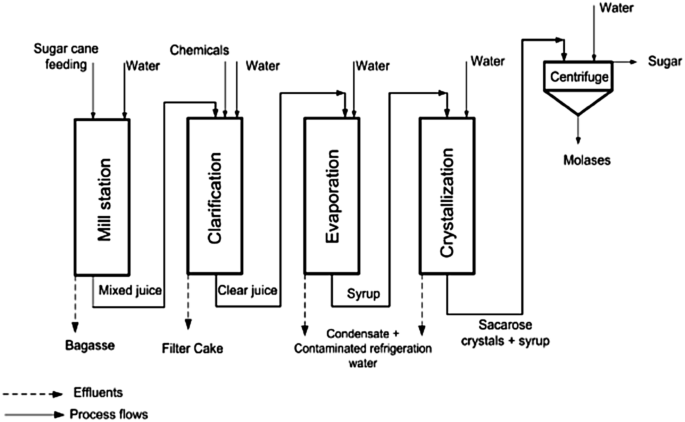Maximizar Rendimientos Y Minimizar Costos: Estrategias Avanzadas Para La Optimización Química Del Procesamiento De Azúcar De Caña
In the realm of walking cane sugar handling, the quest of making the most of returns while simultaneously minimizing prices stands as a powerful difficulty that calls for a critical mix of sophisticated chemical optimization techniques. The ins and outs of this undertaking delve right into the core of effectiveness, where every component of the process plays an important role in achieving optimum end results. By discovering the intricacies of chemical analysis, enzyme use, pH control, filtering, and purification methods, a landscape abundant with opportunities for enhancement and innovation emerges. In the middle of this detailed web of methods lies the guarantee of unlocking untapped possibility and changing the very essence of sugar manufacturing. Cane Sugar Processing Chemicals.
Chemical Evaluation for Efficiency
Chemical analysis plays an essential function in boosting the efficiency of sugar walking cane handling by giving important understandings into the composition and residential properties of the raw products. By performing comprehensive chemical evaluations on sugar walking stick examples, cpus can figure out the exact focus of sucrose, glucose, fructose, and various other components existing in the raw material. This information is vital for optimizing the numerous phases of the sugar walking cane processing chain, from milling to condensation.
Moreover, chemical evaluation enables cpus to identify pollutants such as organic acids, proteins, and minerals that can affect the quality and yield of the final sugar item. By evaluating these pollutants, processors can carry out targeted approaches to remove or mitigate their impacts, ultimately improving the total performance of the handling plant.
Additionally, chemical analysis assists in the tracking of process parameters such as pH, temperature, and thickness, enabling processors to make real-time changes to make certain optimal problems for sugar extraction and condensation. In general, an extensive understanding of the chemical make-up of sugar walking stick is necessary for maximizing returns, minimizing prices, and maintaining high item high quality in the sugar manufacturing industry.

Enzyme Utilization for Raised Returns
With a tactical approach to enzyme utilization, sugar cane processors can dramatically improve their returns while maintaining functional efficiency in the manufacturing procedure. Enzymes play a crucial function in sugar cane handling by breaking down complicated carbohydrates into less complex sugars, therefore boosting the overall sugar removal efficiency. By incorporating particular enzymes tailored to target the different parts of sugar walking cane, such as cellulose and hemicellulose, processors can improve the launch of sugars throughout extraction.
Enzyme utilization supplies the advantage of making the most of sugar returns from the raw material while lessening the power and resources needed for handling. This causes an extra lasting and economical production process. Furthermore, enzymes can assist in minimizing handling time and enhancing the overall quality of the sugar product. Through mindful choice and application of enzymes, sugar walking stick processors can maximize their procedures to accomplish higher yields and profitability.
Ph Control for Ideal Processing
Enzyme utilization for boosted returns in sugar walking cane processing lays the foundation for attending to the essential aspect of pH control for optimal processing effectiveness. Keeping the ideal pH level throughout various stages of sugar walking stick handling is crucial for making the most of yields and lessening prices. By meticulously monitoring and adjusting the pH levels at different processing steps, sugar cane processors can enhance sugar recovery rates, reduce chemical usage, and optimize the overall manufacturing procedure.
Advanced Purification Strategies
Applying innovative purification strategies in sugar walking cane handling boosts the effectiveness and pureness of the end product through refined separation methods. By incorporating cutting-edge purification modern technologies, such as membrane layer filtering and triggered carbon filtering, sugar cane handling plants can attain greater levels of sugar recovery and improved quality assurance.

Activated carbon filtration is an additional innovative technique that aids in the elimination of colorants, off-flavors, and recurring impurities from sugar cane products. By using turned on carbon's adsorption properties, this purification technique improves the clarity and preference of the sugar, satisfying the high standards required by customers and industry laws.
Energy-Efficient Distillation Techniques
Energy-efficient distillation techniques are important for maximizing the sugar walking stick handling industry's power consumption while preserving top quality item standards. Standard like it distillation processes can be energy-intensive, bring about higher manufacturing prices and environmental influences (Cane Sugar Processing Chemicals). Implementing energy-efficient purification approaches, such as vacuum purification or molecular purification, can considerably minimize power find this requirements while enhancing total process effectiveness
Vacuum cleaner purification involves reducing the stress within the purification system, which lowers the boiling point of the fluid combination being processed. This reduction in boiling point reduces the power required for vaporization, resulting in energy cost savings contrasted to traditional distillation methods.
On the other hand, molecular purification makes use of brief course distillation techniques under high vacuum cleaner problems to different substances based upon their molecular weight. This method is particularly efficient for heat-sensitive compounds, as it runs at lower temperature levels, reducing power intake and preserving product quality.
Conclusion

Comments on “Cutting-edge Cane Sugar Processing Chemicals: Maximize Your Refine”